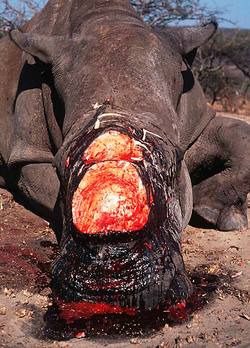 Fuelled by demand from Viet Nam, rhino poaching in South Africa shows no signs of abating, with a record 341 killed there this year to date Click photo to enlarge © Martin Harvey / WWF-Canon South Africa, November 2011—More rhinos have been killed in South Africa in the past 10 months than were killed in all of 2010, new poaching numbers reveal. Statistics from South Africa National Parks show that 341 animals were lost to poaching by the end of October 2011, compared to a record total of 333 last year.
Fuelled by demand from Viet Nam, rhino poaching in South Africa shows no signs of abating, with a record 341 killed there this year to date Click photo to enlarge © Martin Harvey / WWF-Canon South Africa, November 2011—More rhinos have been killed in South Africa in the past 10 months than were killed in all of 2010, new poaching numbers reveal. Statistics from South Africa National Parks show that 341 animals were lost to poaching by the end of October 2011, compared to a record total of 333 last year.
South Africa’s grim milestone comes on the heels of an announcement by WWF last week that rhinos have gone extinct in Viet Nam. The carcass of Viet Nam’s last Javan Rhino was found with a gunshot wound and without its horn.
In September 2011, CAWT partners were instrumental in convening a workshop in South Africa of key stakeholders, including government representatives from rhino range States and others, to devise ways to address the growing rhino poaching crisis.
The workshop's Conclusons and Recommendations are publicly available (PDF, 12 KB)
At a meeting of the Convention on International Trade in Endangered Species of Wild Fauna and Flora (CITES) last year, the international community concluded that the increase in rhino poaching has been caused largely by demand for horn products in Viet Nam.
Law enforcement efforts, while increasing, are not yet sufficient to protect rhinos from poachers or stop the smuggling and sale of their horns by organized crime gangs.
South Africa has been the focal point of poaching because it has the largest population of rhinos in the world. Law enforcement efforts there have been scaled up resulting in more arrests, and some of those convicted are being sentenced to lengthy prison terms.
However, demand for medicinal products containing rhino horn continues to increase in Viet Nam and other parts of Asia. Rhino horn has no proven ability to treat cancer and is no longer a part of the official Chinese traditional medicine pharmacopeia.
Despite an international ban on commercial trade under CITES, rhino horn continues to be smuggled illegally from Africa to Asia. Additionally, legal loopholes allowing for the export of rhino hunting trophies are being exploited in some South African provinces. Improvements are needed in the regulation of hunting permits and the management rhino horn stock piles in the country.